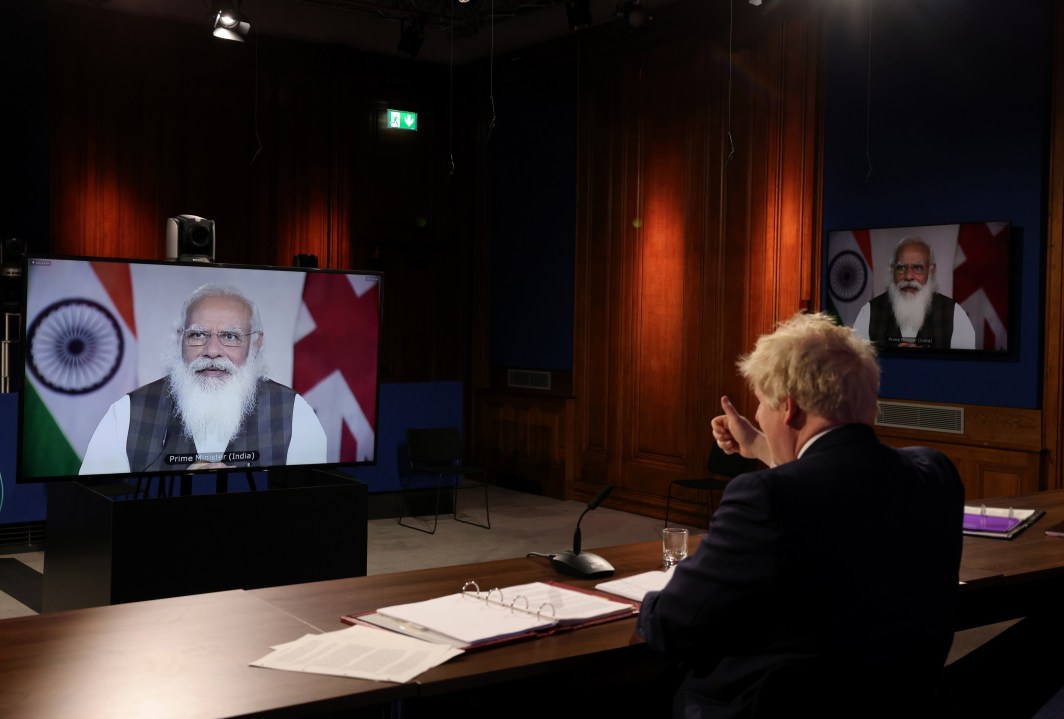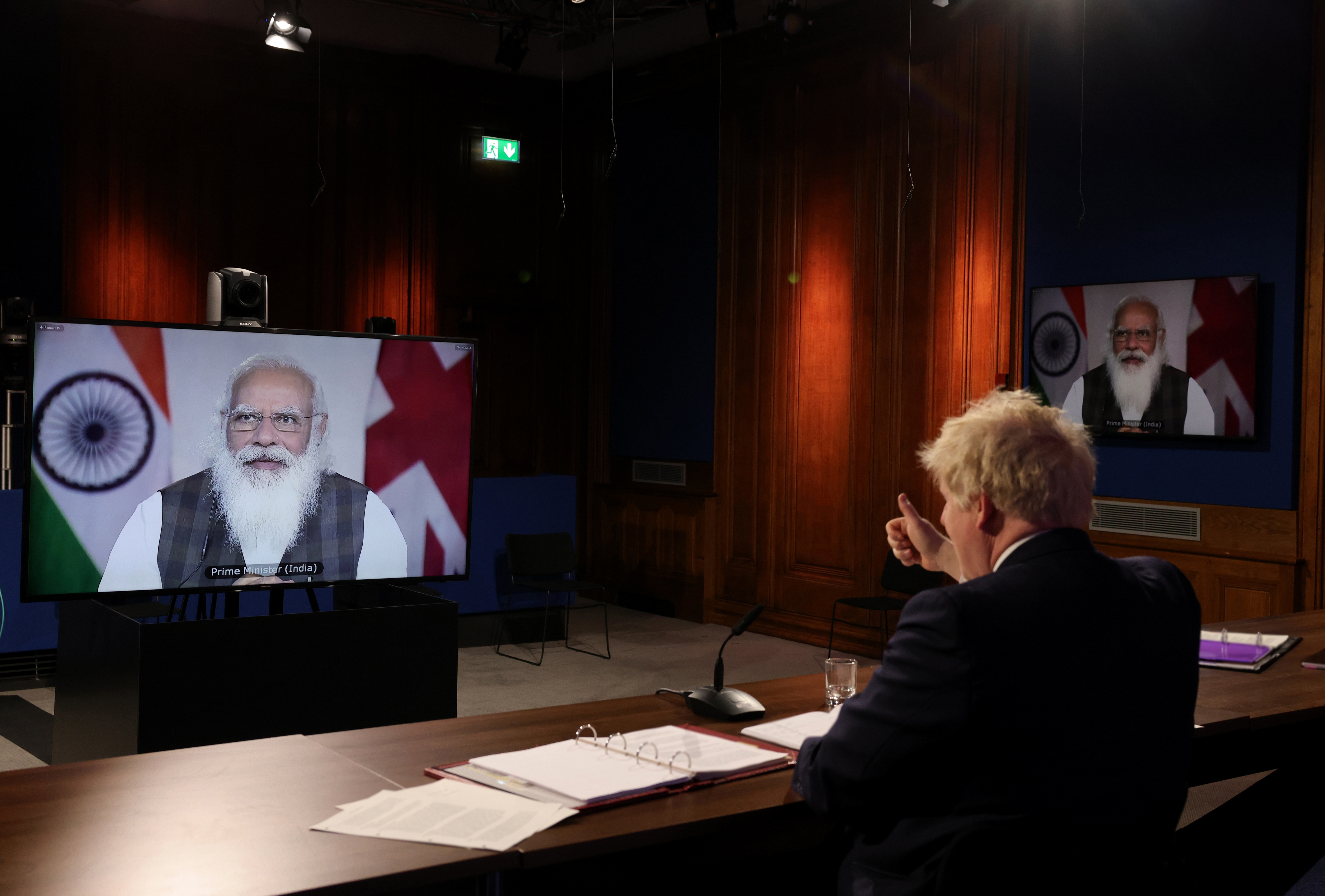Britain and India have been trading for over 400 years. For 190 of those, between 1757 and 1947, the subcontinent was close to being a captive market of the United Kingdom. Today commercial turnover between the two nations is a mere £23 billion — a tenth of the goods and services traffic between Britain and the European Union.
For many Leave voters, Boris Johnson included, expanding trade ties beyond the EU’s borders was a major motivation for Brexit. India was seen as both an exciting emerging market but also a nation that is culturally entwined with this one. However, five years after Britain voted to depart the lucrative single market, all Johnson and Narendra Modi have been able to conjure up is a below-expectation ‘enhanced trade partnership’. Downing Street was surely exaggerating when it called yesterday’s deal a ‘historic commitment’ by the two leaders.
Modi’s attempts at international politics appear increasingly ill-timed to those watching back home
Modi too has been engaged in a game of spin. On the day the pair announced the agreement, the Booker Prize winning Indian novelist Arundhati Roy endorsed a chorus of millions of her compatriots who have been pleading for Modi’s resignation in the face of the country’s resurgent pandemic. ‘We need a government. Desperately. And we don’t have one… I beseech you, step down,’ she penned. But Modi proceeded with the summit in the hope of offering some good news to Indians, demoralised by the Covid crisis.
After a virtual meeting with Modi, Johnson claimed an extra £1 billion worth of UK-India trade and investment had been ensured, along with 6,500 new British jobs. Included too was a £240 million investment by the Serum Institute of India, the world’s biggest vaccine maker. But much of the deal sounded like wishful thinking. Indian companies Infosys and HCL Technologies promised 1,000 jobs each, but their financial commitments were unstated. MPhasis, another Indian firm, will amazingly provide 1,000 jobs by sinking just £35 million in the UK economy.
The agreement does not reflect a major leap forward. A mutual commitment on education could trigger an increase in Indian students studying at UK universities, perhaps an attempt by No. 10 to replace the Chinese students that have been abandoning British higher education thanks to Covid and increasing hostilities. Meanwhile British fruit producers will be able to export apples, pears and quince to India for the first time. But a pledge to remove barriers to enable British lawyers to practice in India — so far unrealised because of resistance from the Indian legal fraternity — was recycled, having been mooted for decades.
Trade minister Liz Truss persevered with her ‘win-win’ sing-song in a TV interview, while conceding India was yet to give in on lower tariffs on imports of British cars and Scotch whisky. There was obviously no meeting of minds on an important Indian demand for reduced import duties on garments and textiles either.
In 2010, David Cameron, enthusiastic about a special relationship with India, aimed at doubling trade between the two countries in five years from around £10 billion. This target was missed. The suggestion of a further doubling over the next decade is an admission that the most populous member of the Commonwealth will not significantly compensate for the likely loss of revenue from the EU.
Both nations continue to harp on about a free trade agreement, with a promise of full talks resuming in the autumn. India and the EU began negotiating one in 2007 — with Britain an integral part of that dialogue — before suspending the exercise in 2013 due to what Brussels described as ‘a gap in the level of ambition’. While the two sides remain engaged, there is still no tangible progress. There are, in fact, fundamental differences in a comprehensive opening of markets and on social and environmental consequences in the event of a free trade agreement.
The issues that impede an India-EU deal have also plagued an Anglo-Indian understanding. For example, an Indian quest for easier travel to the UK was seen as untenable given British wariness towards mass immigration — although scepticism over immigration has softened in the last few years. Britain’s relaxation of visa rules was also dependent on India taking back tens of thousands of suspected illegal immigrants in the UK — which Modi agreed to but reneged on in 2018. Soon after the talks between the heads of government, Priti Patel and external affairs minister Subrahmanyam Jaishankar signed a protocol in London whereby Indian professionals will be permitted to work in the UK for up to two years. Meanwhile, the process to return Indian nationals who have no right to stay in Britain will be accelerated.
Johnson and Modi upgraded the ‘strategic partnership’ established in 2004 when Tony Blair was prime minister to a ‘comprehensive strategic partnership’. Its meaning remains unarticulated. Britain hopes the change translates into greater defence purchases by India. Modi, despite bankrupting his country, has displayed a penchant for military hardware consistent with his authoritarian tendencies. If China continues to violate Indian territory, British arms manufacturers may soon see the rupees flooding in.
There have been no major investment projects either way since Modi came to power in 2014. Unfortunately for Britain, the Indian economy has subsequently collapsed under the weight of coronavirus. As it is, the Indian Prime Minister had previously stewarded a steady downward spiral in the Indian economy. Indian businesses are despondent and exploring options abroad. Britain could be a beneficiary of such investment.
Modi’s attempts at international politics appear increasingly ill-timed to those watching back home. His unpreparedness in the face of a second Covid wave and a chastening election defeat in the state of West Bengal have rattled his ruling Bharatiya Janata Party. The prospect of greater trade with Britain is unlikely to ease their discomfort.







Comments